America*s Open Door Policy Political Cartoon By Taner Marquez
advertisement
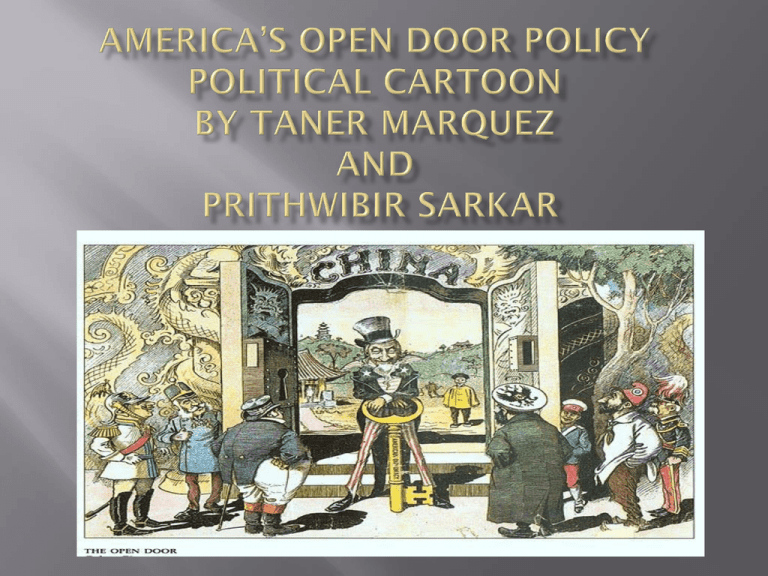
The political cartoon portrays America, a.k.a. “Uncle Sam,” opening the door to China to the rest of the world. Uncle Sam holds a large golden key and stands directly in front of the extravagant gates, welcoming people that symbolize other countries with spheres of influence in China at the time. The people to the left are all most likely representing Britain. The man in the circular hat and wearing a trench coat to the right most likely represents Russia. The creepy looking man behind the right door probably represents Germany. The man farthest to the right with the feathered hat represent France Finally, the man directly in front of the man with the feathered hat may represent The Ottoman Empire/The Middle East. America’s Open Door Policy in China stemmed from its’ increased interest in Imperialist ideals, especially after the Spanish-American war gave the US the Philippines, Guam and Hawaii. It also was influenced by the promise of cheap foreign labor and goods. Also, Europe’s scramble for territory within China to control left it open to complete dissension between the world powers, separation of China into colonies, and ultimately a possible world war. The Open Door Policy was originally proposed by U.S. Senator John Hays and accepted by Europe in the year 1899, during William McKinley’s presidency. There were various effects form the Open Door Policy, including: The Failed Boxer Rebellion of 1900 that killed a speculated 50100,000 people, mainly Chinese civilians and Chinese Christians, in an attempt by the Chinese to end foreign influence in their country. The Russo-Japanese War from February 1904- September 1905 that began over conflicts between Russia and Japan over who would control the ports along China’s coast. It was settled in 1905 after Russia gave Japan a number of Chinese ports and the southern portion of Sakhalin Island. Japan’s Twenty-One Demands that were created by Japan and sent to China; created to increase Japan’s influence over China. It was denied by the weak Chinese government and shot down by Britain and America, who rightfully stated it was in violation of the Open Door Policy. The Rise of Imperial Japan caused by victory in The Russo-Japanese War and the failure of the Twenty-One Demands which eventually set the stage for Japan to become a major imperial power and invade China and other territories in the years leading up to and during the Second World War. The cartoon is just a direct portrayal of the predominant American foreign policy to Asia, especially China, at the time. The Open door policy was designed to keep Chinese territorial integrity intact from other nations but still allow free flowing trade from all powerful nations through the designated Treaty Ports in China and Korea. It shows that American Society at the time still favored expansionism and being a world player and being involved in the affairs of other nations that could potentially benefit the US while hurting possible rivals to US power. It helps us understand just how powerful and important the US was to the rest of the world in being able to open free, unhindered trade between China, and the rest of the world. The cartoon has few limitations. This cartoon as drawn from an American perspective and shows a view more sympathetic with the goals of America, which were to open free trade with China to the rest of the world. In the cartoon, it is depicted as if the US singlehandedly opened China and as if they fully control its destiny. This is why Uncle Sam is holding the key that opens China and standing in the gateway as if to regulate and control the other nations trying to get in. The key is inscribed with “American Diplomacy” as if it was American politics alone that unlocked China to foreign trade. To a large extent, US territorial expansion was a legitimate policy to follow because it opened up foreign markets to profitable free trade with the rest of the world and prevented one nation except for maybe itself from becoming too powerful and gaining to much influence on China. The fact that othe powerful nations were building their empires meant that the Ushad to gain some power and influence abroad as well in order to compete and be a major world power.
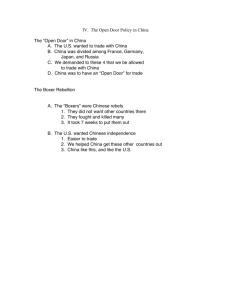

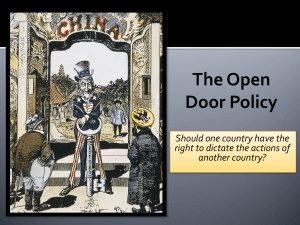
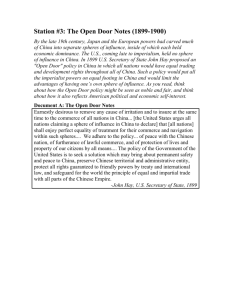
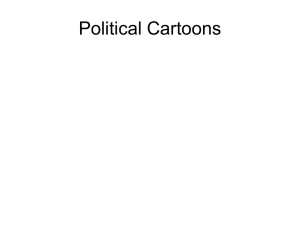
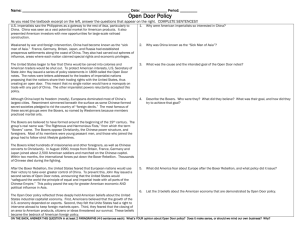


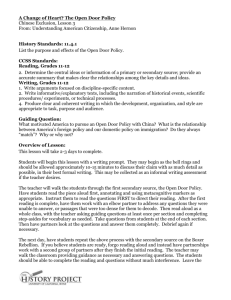


![Phrasal Verbs in Cartoons[2]](http://s2.studylib.net/store/data/005310718_1-897d1a57ddfabbe64c60ba43d0222e3b-300x300.png)